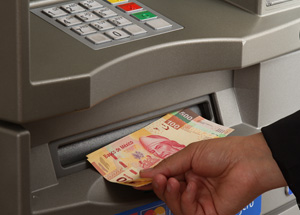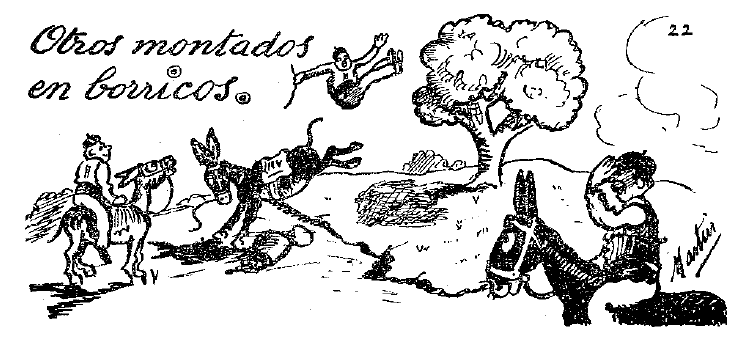
| Языки :: Испанский |
| Аудио |

 |
|
 |
|
63 |
Español |
Spanish |
|
Lección Veintidós (22) |
||
| Hagan el favor de los billetes (1) | Tickets, please. | |
| 1 | En este momento pasa el camarero del vagón-restaurant en chaqueta blanca (2). | At this moment passes the waiter of the dining-car, in (a) white coat. |
| 2 |
Tomo el primer turno, para las doce, pues tengo bastante
apetito; el inglés toma el segundo, para la una. Las señoras no toman ticket (3). |
I take the first service [turn] for midday [the 12], for I have enough
appetite; the Englishman takes the second, for one o'clock. The ladies take no ticket. |
| 3 | Pasa también el revisor : « Hagan el favor de los billetes. » | Passes also the ticket-collector : " Tickets, please!". |
| 4 | Poco después viene un policía (4),
que examina la documentación de cada uno. |
Soon [little] after comes a policeman, who examines the papers of every one. |
| 5 | Son las once; me levanto, y me voy al pasillo para estirar un poco las piernas. | It is eleven [are the 11] ; I get up and go into the corridor to stretch my legs a little. |
| 6 | No hay nadie en el pasillo; algunos departamentos están vacíos (5). | There is nobody in the corridor; a few compartments are empty. |
| 7 |
Hace calor; el tiempo es magnifico; el sol brilla sobre los olivos (6). |
It is hot [makes heat], the weather is splendid; the sun shines on the olive trees. |
| 8 | De vez en cuando se ven aldeanos trabajando en el campo, y otros montados en borricos (7). | From time to time peasants are seen [see them] working in the country, and others riding [mounted on] donkeys. |
| EJERCICIOS | EXERCISE : | |
| 1 | ¿Qué tiempo hace hoy? | How's the weather [what weather makes it)] to-day? |
| 2 | Hace bueno; hace sol; ¿no se levanta usted? | It is [makes] good; it is sunny [makes sun]; don't you get up? |
| 3 | ¿Para qué levantarme? No tengo nada que hacer, no trabajo hoy. |
Why [what for] get up? I have nothing [that] to do, I don't work to-day. |
| 4 | Yo me he levantado a las ocho, y he trabajado un poco. | I have got up at 8, and have worked a little. |
| 5 | Haga el favor de darme el libro que esta sobre la mesa. | Please give me the book which is on the table. |
| 6 | Con mucho gusto. | With much pleasure. |
| 7 | Yo leeré hasta las once, y me levantaré después. | I shall read until [the] 11 and I shall get up afterwards. |
| 8 | Hasta la vista. | See you again [until the sight]. |
| NOTES. | |
| 1 |
If you please! is expressed by Haga el favor (do the
favour!), if one person only is addressed, and by Hagan el favor, if several. |
| 2 |
Restaurant is pronounced (resta_ooran). Also : restoran or restaurante (resta_ooranty). - Chaqueta probably comes from French jaquette (tail-coat), but means a (short) jacket, coat. |
| 3 |
A few adjectives, among which primero and bueno
lose final o before a singular masc. noun. |
| 4 | El policía : the policeman; la policía : the police. |
| 5 |
Nada : nothing; nadie (naddiay) : nobody;
algo : something; alguno : some. - Están vacíos, and not son, for the present state, not the nature, of the compartments is implied. Some compartments are small, would be : algunos departamentos son pequeños, and not : estan. Notice, sent. 5, that, to express time, one says : son. |
| 6 | Pron. : (mag-neefeeco). The ground is : el suelo. |
| 7 |
De vez en cuando : from time to " when " (time). To see : ver. To work : trabajar (guttural j). |
|
La mesa (mayssa) comes from Latin mensa, table.
- Hoy, from Latin "hodie". |
|
|
El pasa, examina, brilla, he passes, examines,
shines : present. |
